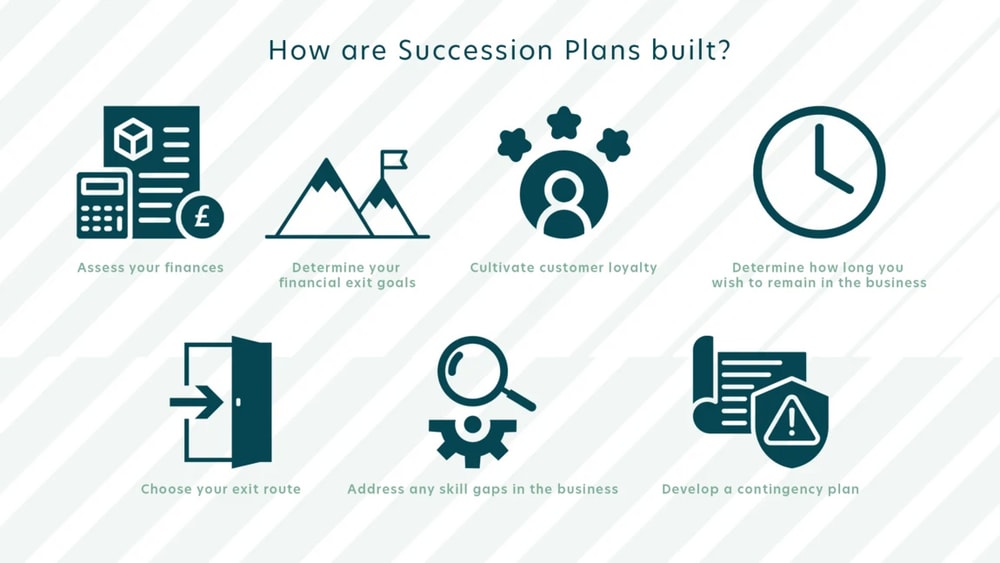
posted 9th May 2024
What is succession planning?
When planning the future of your business, and the steps needed to achieve your goals at the time of sale, it is important to have a clear and concise action plan to ensure that you do reach that point of success, however that might look for you. That’s where succession planning, or exit planning, comes in. Having a clear business exit strategy is the best way to secure the best long-term result for you and your company.
Essentially, succession planning involves creating a realistic timeline, with specific milestones, that you can follow to make sure everything is lined up to result in maximum levels of success at the point you have scheduled for selling your business. Every business is different and succession planning involves different things for every business owner. For some you might want to hit a certain turnover goal, some might want to nurture suitable successors within the business, and some might want to secure specific clients. It is crucial to identify the steps that will allow you to reach these goals, so that when you do sell your business, nothing falls short and your personal plans remain on track.
A strong, comprehensive exit strategy will take into account all operations, finances, stakeholders, and clients, detailing all actions necessary to sell the business in a way that achieves your aims.
Why is succession planning important for business owners?
There are many reasons for owners wanting to exit their business, be it early retirement, leaving a family legacy, or moving on to the next venture, so it is important to implement strategic plans and lay down the right stepping stones that will allow you to most efficiently reach your desired outcome. Spending time building a succession plan, with the support of experts, will allow you to better navigate this path.
Selling your business involves many different aspects and various considerations, including financial objectives, your legacy, your business’s brand, your clients and your employees. The type of business sale you might choose could have a different effect on each of these, and adequate planning is the only way to make sure the execution of the sale goes smoothly.
For example, an Employee Ownership sale involves selling at least 51% of shares to employees (usually through a trust). If you want your business to become employee-owned, do you need to plan any restructures to be eligible? Do you need to introduce more employee engagement initiatives? If you intend for Employee Ownership to be a milestone on your journey to full exit at a later date, in how many years do you want that to be? What will be the path of your full exit from the business?
Similarly, if you are hoping to initiate a full exit from your business at a specific point through a trade sale, do you know how much capital you want to realise at that time? What is the difference in your business’s value now, and how long will it take you to reach your target?
The importance of succession planning to exit your business cannot be understated. As a business owner, you will have specific financial goals in mind, and adequate succession planning acts as a roadmap to get you there. Fail to prepare, and you could walk away from your business completely unsatisfied. Having a plan in place can support your strategic decision-making, boost the value of your business, and ensures you always have an end point to work towards.

How are succession plans built? Financial and legal considerations.
With your goals in mind, working backwards from there will help you understand the steps needed to get you and your business where you want it to be. When you have done that, there are several steps that will help you form a comprehensive plan to exit your business:
- 1. Assess your finances: A vital first step in building your exit strategy is to scrutinise your finances, both your personal finances and your businesses finances. That includes reviewing your revenue streams and your outgoings, identifying key client accounts, evaluating your assets, and calculating any ongoing debts or financing. Seeking a valuation of your business at this point will give a reliable figure to set as your starting point, allowing you to estimate changes you might need to make to reach your ideal valuation figure. You could also seek a financial forecast for more details.
- 2. Determine your financial exit goals: How much capital do you want to realise at the point of sale? Naming the figure will help you see the path you could follow to get from your current valuation figure to the number you are looking for. You must also consider your tax commitments at the time of sale, and if that’s something you’re looking to minimise, you should build that into your plan and seek out professional tax advice to guide you.
- 3. Cultivate customer loyalty: Having a loyal and stable client base is important to any business, especially when you are planning to sell. It’s crucial to find ways to retain valuable customers or client accounts. Retaining high-value clients is often more cost-effective than winning new ones, and having those high-income accounts in place, and for longer, will help to add value to your business.
- 4. Determine how long you wish to remain in the business: This is crucial when planning your exit strategy and succession timeline. Having clarity on how long you want to remain in your business will help you determine goals, targets, and potential buyers. If you’re looking to exit soon, you will need to be realistic as to what you can expect from the sale. Planning your exit over a longer period will give you breathing room to implement any changes required to reach your goal. The important thing to your plan is to set a timeframe.
- 5. Choose your exit route: This is important for you to determine how you will exit (MBO, EOT, Private Equity sale etc), the tax requirements, and what will happen to your businesses after you are no longer at the helm. As well as your financial goals, determining what your wishes are regarding your legacy will help you decide the method of your exit.
- 6. Address any skills gaps in the business: This is an opportunity to see what can be improved in the business before you exit. If you are essential to operations or revenue generation, it’s worth thinking about how you can change things so that you are not a dependency, preparing the business to continue in your absence. Additionally, are there any skill gaps that costing the business time or money? Fixing these could improve or optimise income streams.
- 7. Develop a contingency plan: Drawing up a thorough contingency plan as part of your exit strategy is a smart way to ensure that you will remain on track should certain elements of your plan not materialise or the transaction itself fall through.
How to execute your succession plan?
To execute your succession plan successfully, professional tax, financial, and legal advice is needed. There are too many interconnected elements running throughout succession plans and exit strategies that could cause issues or inconsistencies if not reviewed or put in place by experts.
Tax advisors help create an advanced succession plan for your business that will consider potential tax implications of a sale relative to your business structure, eligibility, and profits predicted profits. A tax adviser will also advise on which sale types could be most tax advantageous.
A business valuation is one of the most important parts of your succession plan. The process should deliver a realistic valuation figure, taking into account all aspects and assets of the business, allowing you to set an accurate benchmark by which to measure the other elements of your exit strategy. A professional corporate finance team will take the guesswork out of a valuation and provide a figure within the context of the industry and current M&A climate overall, giving you confidence across the rest of the succession planning process. From the valuation, a corporate finance team can also work with you to find the right buyer for your business.
Professional legal support is not only essential for agreeing terms and deal structure during the transaction itself but seeking advice from experts will ensure companies house compliance, manage shareholder agreements, support employee share schemes, and maintain stat books. All things that will potentially be addressed in your succession plan.
Overall, building a succession plan or exit strategy is not a quick exercise. The more you put into it the more you will get out. A highly detailed exit plan that offers a professional analysis of your current situation, with the stepping stones to your version of success plotted accurately, will certainly benefit you more and will be more likely to deliver the results you are looking for, compared to any hasty decisions or half-formed plans.
GS Verde Group are the business-focused experts in getting deals done. With law, finance, tax and communications teams, the Group offers the necessary multidiscipline expertise to support each aspect of a succession plan. From a business valuation, financial forecast, tax planning, compliance, and growth marketing, to the transaction itself, GS Verde Group provides true end-to-end support as a complete advisory team, optimising and de-risking the entire process to get you the results you need.








